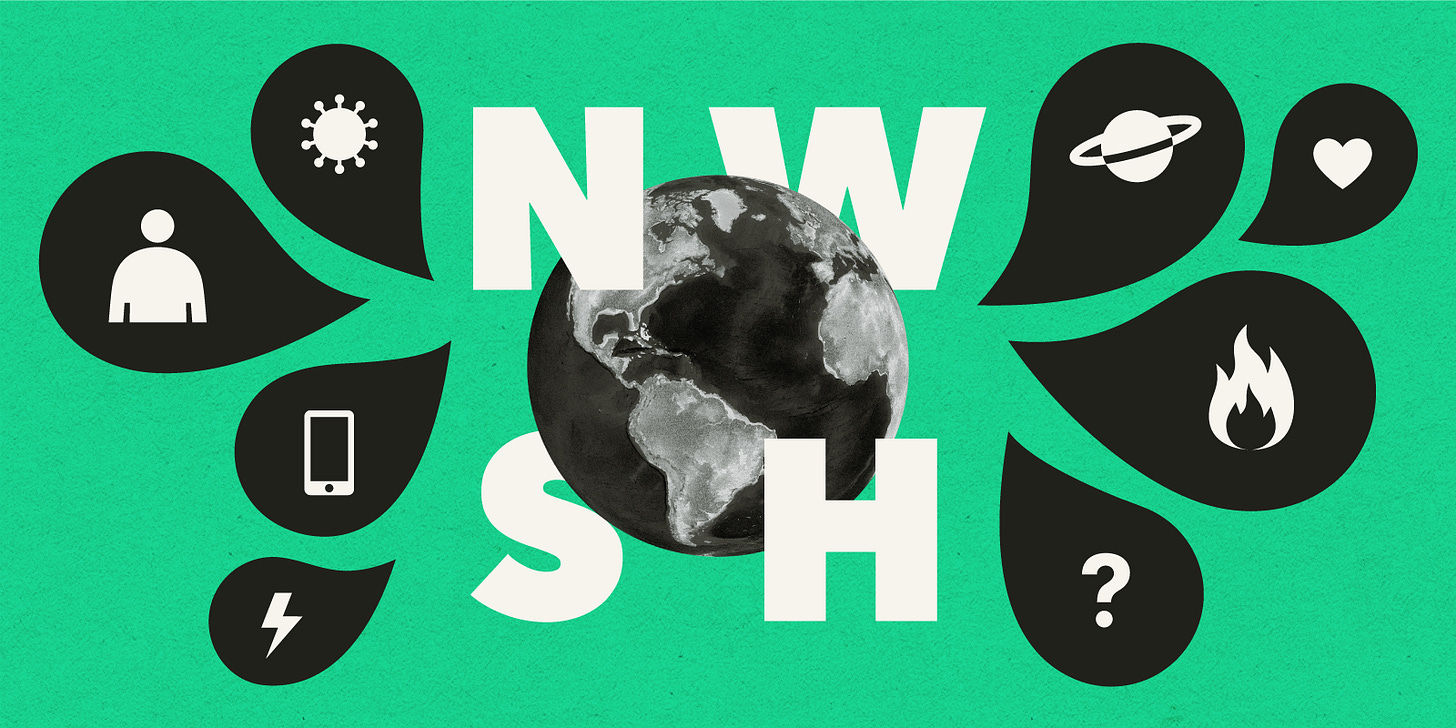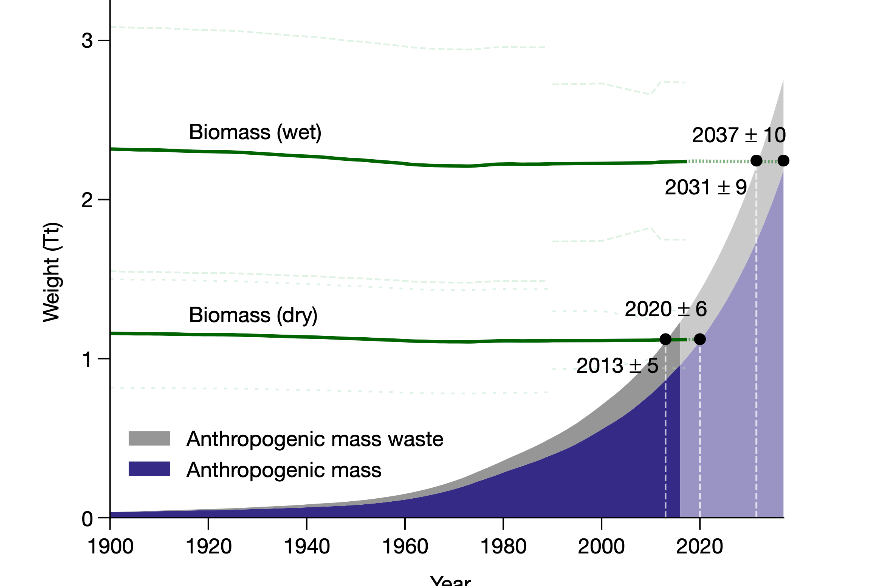New Week Same Humans #16
Facebook's latest experiment is part video game and part reality TV show. A new report reveals the world's worst plastic polluter. Plus more news and analysis from this week.
Welcome to the Wednesday update from New World Same Humans, a newsletter on trends, technology, and society by David Mattin.
If you’re reading this and you haven’t yet subscribed, then join 14,000+ curious souls on a journey to build a better shared future 🚀🔮
💡 This week’s Sunday essay asked: Can we put humans back at the centre of our story about life, the universe, and everything? 💡
This week, the Japanese government wants AI to play cupid in a bid to reverse low birth rates.
Meanwhile, Facebook launch a fresh take on the reality TV show. And a new report reveals just how much plastic we’ve strewn across the Earth.
Let’s do this!
😍 Japan’s new love machine
The Japanese government wants to start matchmaking its young people using AI.
Japan has a problem with babies: it’s not making enough of them. The population is forecast to nosedive from 127 million in 2020 to 88 million by 2065. In an attempt to reverse this trend, the government is investing in AI technology that will match suitors on values and personality type. Local prefectures will start implementing the new system on state-run dating platforms in 2021.
Meanwhile, Microsoft has just filed a patent for technology that can create a chatbot version of a specific person. Feed it relevant social media posts, images, and voice data, and out pops a AI-fuelled emulation of your Loved One. There’s speculation that Microsoft want to offer us the ability to create chatbot versions of dead friends or relatives.
⚡ NWSH Take: I’ll say what we’re all thinking: Black Mirror. Yes, there’s an AI dating episode, and a dead boyfriend chatbot episode. But there’s also a powerful lesson in these two examples of sci-fi meets reality. // Great fiction sets eternal human themes against a specific historical backdrop. Great foresight is much the same. The reason Black Mirror creates such compelling – and eerily accurate – visions of the future is because it sees emerging technologies through the lens of core human needs. These two innovations are about the collision of AI and love. But the combinations are endless. Here’s an exercise. Take one technology set to transform your industry. Take three core human needs (some ideas: social connection, security, value, convenience, wellbeing, status). What happens – to your industry, business, team – when they collide?
🏭 A weighty Anthropocene update
The Earth is at a crossover moment.
According to a new paper in Nature, in 2020 the mass of all human-made objects worldwide exceeded for the first time that of the living biomass, which includes all plants, trees, animals, and insects.
That rather ordinary-looking chart visualises an astonishing reversal. In 1900 the mass of all human-made objects was equal to around 3% of the world’s biomass. Today, the equivalent figure is over 100%. The paper’s authors estimate that the mass of all plastic alone is greater than that of all the Earth’s land and marine animals.
Where is all that plastic coming from? This week the charity Break Free From Plastic released the results of its annual audit, which saw 15,000 volunteers worldwide collect 346,494 pieces of plastic waste from beaches, parks, and other sites. Coca-Cola, Pepsi, and Nestlé were the worst polluters for the third year in a row.
📺 Avatars killed the reality star
Facebook launched a reality TV show with a difference this week.
Rival Peak is a kind of virtual homage to Survivor. It sees AI-fuelled characters thrown into a virtual woodland environment and asked ‘to survive, overcome obstacles, and solve puzzles’ in a bid to be the last avatar standing at the end of the 12-week run.
And yes, that is Will Wheaton.
⚡ NWSH Take: Rival Peak is part reality TV show, part massively multiplayer online game. The result is something new. We’ve heard a lot this year about new kinds of live music and sports events, but this experiment is a reminder of the power of AI to transform scripted and reality TV, and other formats. // Combine this with reports that Spotify is planning AI-generated music, and you have the makings of an algorithmic content revolution. // The show taps into the rising trend for virtual humans, which I wrote about in NWSH #41. Online influencers transformed marketing in the 2010s. Where will the avatar influencer lead us?
🗓️ Also this week
🧮 A quantum computer took 200 seconds to carry out a calculation that would take the world’s fastest supercomputer 600 million years. It’s the creation of researchers at the University of Science and Technology of China.
🚕 Amazon’s pre-launch self-driving taxi was spotted outside a San Francisco hotel. The retail giant acquired self-driving startup Zoox for $1.2 billion earlier this year; it will reveal its first car to the public on 14 Dec.
🦾 The French army has the go-ahead for bionic soldiers. An ethics committee has said the army can trial implants that make soldiers faster and smarter, as well as those to allow direct connectivity between soldiers and weapons systems.
👗 Spanish fashion label Balenciaga released its Fall 2021 collection inside a video game. In the absence of a catwalk show, the label invited fashionistas to play the game Afterworld: The Age of Tomorrow inside VR.
🤓 A US entrepreneur is celebrating the real humans behind AI-fuelled fake faces. The This Person Exists presents the faces used to train GANs such as the one behind thispersondoesnotexist.com.
🚨 California police are using drones to chase suspects on the streets. That’s according to a new report by the New York Times.
⚖️ US lawyers are fighting algorithms that keep low-income people trapped in poverty. They include those that decide credit scores, and access to medical care and housing.
🌍 Humans of Earth
Key metrics to help you keep track of Project Human.
🙋♀️ Global population: 7,831,026,960
🌊 Earths currently needed: 1.7735079468
🗓️ 2020 progress bar: 94% complete
📖 On this day: On 9 December 1968 the US inventor Douglas Engelbart publicly debuted the computer mouse, hypertext, word processing, and a graphical user interface, in what came to be known as The Mother of All Demos.
The future is now
So Microsoft is planning our chatbot afterlives. And quantum computing means the work of millions of years can be done in seconds. It’s still 2020, right?
It may sometimes feel as though we’re living in the future. But right now, we at New World Same Humans are building a community dedicated to understanding today and tomorrow. We started as a small tribe back in January; now we encompass more than 14,000 founders, designers, marketers, technologists, policy makers and more.
You can help make our community more diverse, and more useful: all you have to do is share!
So if you found today’s instalment valuable, why not take a second to forward this email to one person – a friend, relative, or colleague – who’d also enjoy it? Or share New World Same Humans across one of your social networks, and let others know why you think it’s worth their time. Just hit the share button:
I’ll be back on Sunday. Until then, be well,
David.
P.S Huge thanks to Nikki Ritmeijer for the illustration at the top of this email. And to Monique van Dusseldorp for additional research and analysis.



